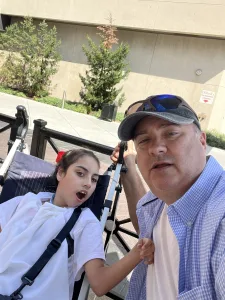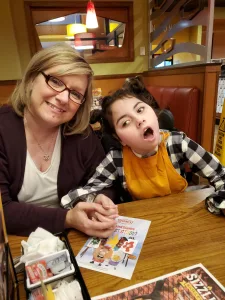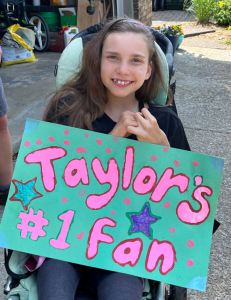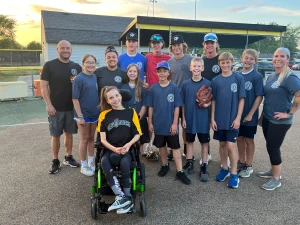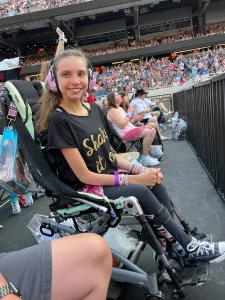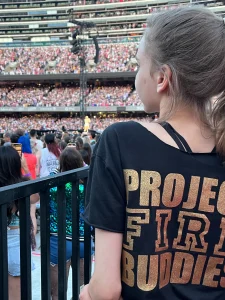DCFS Scholarship Opportunity for Current and Former Youth in Care
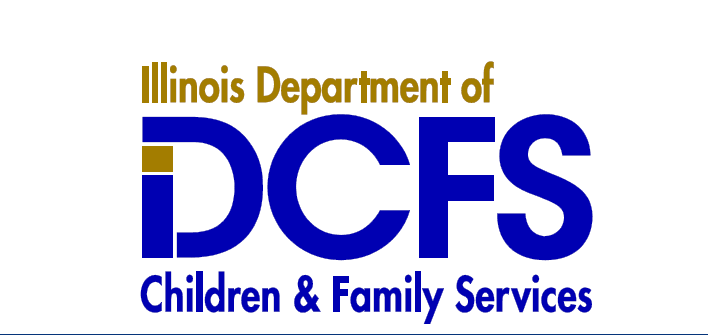
The annual academic scholarship program is taking applications for the upcoming school year through March 31.
The Illinois Department of Children and Family Services (DCFS) is currently accepting applications for the 2024 DCFS Scholarship Program. The program offers tuition money and academic fee waivers to current and former youth in care attending Illinois colleges after high school.
The program is available to youth:
- Who have an open DCFS case
- Whose cases were closed through adoption or guardianship
- Who aged out of care at 18 or older
Students interested in attending Illinois trade schools, community colleges, or traditional colleges or universities and who are at least 16 years old on March 31 may apply.
The scholarship application is available online.
Scholarship recipients will receive:
- Up to five consecutive years of tuition and academic fee waivers to be used at participating Illinois state community colleges and public universities
- A monthly grant to offset other expenses
- A medical card
The program will select scholarship recipients based on:
- Their scholastic record and aptitude
- Community and extracurricular activities
- Three letters of recommendation from non-relatives
- A personal essay illustrating their purpose for higher education
This DCFS Scholarship Program tip sheet has more details about eligibility requirements, available benefits and what the scholarship does not cover.
DCFS encourages students to submit their applications before the March 31 deadline.
Last year, DCFS awarded scholarships to 259 college-bound youth, the most in the agency’s history.
For questions about the application process or for more information, contact the DCFS Office of Education and Transition Services at (217) 557-2689 or DCFS.Scholarship@illinois.gov.
See the 2024 scholarship press release for more details.
DSCC Families, It’s Time to Share Your Input!
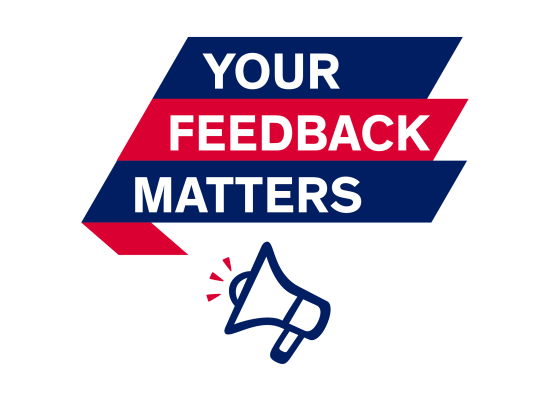
Our annual family survey is an easy way to share your feedback and make a direct impact.
Our participant families are important to us, and your feedback matters.
On Feb. 15, all Division of Specialized Care for Children (DSCC) participants will receive our annual family survey.
This survey asks how well our team members support your family and meet your needs. It also asks about:
- Your contact preferences
- How and when you’d like to meet with our team
- How well our staff communicates with you
You will receive this survey either by email or mail, based on your preferences. If you respond, you will have a chance to win a $50 Visa gift card.*
Your responses will help us strengthen your services. They also guide updates to our DSCC policies and procedures that affect your family.
Our surveys are optional, but we strongly encourage you to share your experiences. We want to ensure we’re doing all we can to help you meet your family’s needs and achieve your goals.
* Please note: Foreign national nonresident aliens are not eligible for the gift card participation prize.
How Your Feedback Makes a Difference
Listening to our participant families is a priority. Your ideas and concerns have helped strengthen our services and guide improvement projects.
Here’s an overview of how the 2023 survey input and overall family feedback made a difference at DSCC:
- Our authorizations are now easier to fill out and keep up to date. We updated the form authorizing us to share information with multiple providers, meaning only one signature on one form.
- Our online resource library is now searchable. Families shared their need for more resources. In response, we updated our online Resource Directory and Events page to add search features. This improvement should help all Illinois families of children and youth with special healthcare needs find and share resources more easily.
- We resumed face-to-face visits. Our care coordination teams resumed face-to-face visits with families following the end of the public health emergency on May 11, 2023. Meeting in person should further improve our connection and engagement with families.
- We created a new Family Portal. In October 2023, DSCC introduced a new Family Portal to better connect families with their care teams. The portal gives participant families one place to communicate with their care coordination teams, sign documents and access information.
- We created “All About Me” Pages to help others get to know your child. DSCC developed “All About Me” Pages so families can highlight their child’s strengths, medical needs and more. Families can personalize the templates to best fit their child’s personality. You can share these templates with medical providers, schools, other caregivers and so on. These pages should make it easier to share what works best for your child, what they like and dislike, and their medical needs. These templates are available on our website’s “All About Me” Pages section.
- We’ve partnered to improve nursing availability throughout the state. Nursing agencies that work with DSCC can now receive a license to work across the state. We partnered with the Illinois Department of Public Health to make this change. The new license process offers more opportunities for nursing coverage for families of children and adults with complex medical needs. DSCC is also developing NurseNet. This interactive website will allow families looking for nursing to connect with nursing agencies.
Please be on the lookout for our annual survey on Feb. 15.
If you have questions or need more information, please contact your Care Coordinator.
We appreciate your partnership and look forward to hearing from you!
Project to Improve Mental Health Support Benefits DSCC Teens
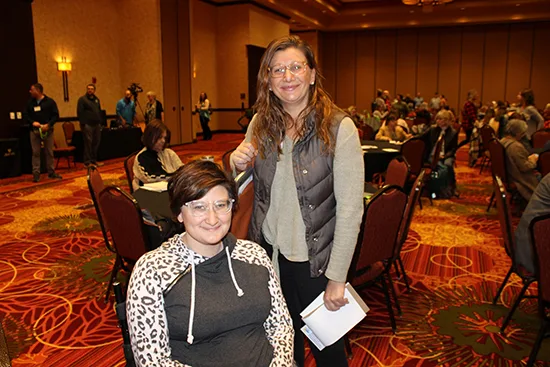
The B.E.S.T. study looks at how care coordination services that include mental health support can help teens with intellectual and developmental disabilities.
The teenage years can be a challenging time for all teens, including teens with intellectual and developmental disabilities (IDD).
Is your teen or young adult feeling sad, stressed or overwhelmed?
Consider joining the B.E.S.T. study. B.E.S.T. stands for Behavioral Health Stratified Treatment (B.E.S.T.) to Optimize Transition to Adulthood for Youth with IDD.
The B.E.S.T. study wants to know if care coordination services combined with mental health programming can help teens with IDD live happier and healthier lives.
All Division of Specialized Care for Children (DSCC) participants receive care coordination services. B.E.S.T. study participants receive access to additional behavioral and mental health resources and support.
DSCC participant Lily Kohtz, 19, (pictured on the left in the above photo) says her mental health has improved since taking part in the B.E.S.T. study.
Lily has spina bifida, uses a wheelchair and has difficulty with anxiety and depression due to her disabilities.
“I think a lot of people don’t connect anxiety or depression to having a disability,” she said. “The B.E.S.T. study has helped me talk about these things. We all have bad days, but depression is worse. Understanding how disability and mental health are tied together and having strategies to use to help me cope has really helped me.”
Lily says she’s enjoyed the online group sessions, where she now meets monthly with four other teens and a group leader. All meetings are confidential.
“We go over coping strategies such as controlling your thoughts and getting rid of the negative. I frequently use the skills we’ve learned and feel like my mental health has improved,” she said.
Lily’s mom, JoAnn Watkins (pictured on the right in the above photo), agrees that the study has benefitted Lily in many ways.
“I’ve seen a positive difference in Lily since she started with the B.E.S.T study. She’s using the skills she’s learned, and you can really see the improvement in her attitude and overall mental health.”
The study began recruiting participants in late 2022. More than 250 DSCC participant families have enrolled in the study so far.
Eligible DSCC participants must be enrolled in DSCC’s Core Program or Connect Care Program. (Please note that DSCC teens enrolled in the Home Care Program are not eligible to participate.)
The B.E.S.T. study is a free and voluntary project. Teens can join the study if:
- They currently have a DSCC Care Coordinator and are enrolled in DSCC’s Core or Connect Care programs.
- They are between 13 and 20 years old.
- They have an intellectual or developmental disability.
- They can comprehend at a fourth-grade or similar level.
- They can read and speak English.
- They have a computer, tablet or smartphone they can use to access the internet.
- They have permission from their parent, caregiver or guardian (if they are under 18).
The B.E.S.T. study team developed the project with input from a group of B.E.S.T. Study Scholars. These scholars are teenagers with IDD who tested and reviewed all of the B.E.S.T. study materials.
Teens who join the study are put into one of two groups:
- Group A receives care coordination services as usual from their DSCC Care Coordinator.
- Group B receives care coordination services and mental health support from the B.E.S.T. team. This support is based on each teen’s needs and can include:
- Mental health education
- Online group sessions
- Caregiver education and support
The study is a virtual program that will continue recruiting through December 2025.
The B.E.S.T. study is a partnership between DSCC and the University of Illinois Hospital and Health Sciences System (UI Health), the University of Illinois Chicago’s (UIC) Department of Disability and Human Development and the UIC Department of Pediatrics.
The principal investigators are Dr. Benjamin Van Voorhees and Dr. Kristin Berg.
The B.E.S.T. study team includes mental health professionals from Illinois, California and Massachusetts. They are all working together to find a way to promote the health and well-being of teens with IDD.
You can learn more information for both teens and parents/caregivers on the B.E.S.T. study website.
If you would like to join the study or have questions, please email the B.E.S.T. study team at beststudy@uic.edu or call (833) 732-5778.
If you choose to join, you and your family can support research that helps other teens and families.
Both parents/caregivers and teens must agree to be in the study. (Note that if a teen is their own legal guardian, they can participate alone or with a parent/caregiver if they choose.)
Those who join will be compensated for their time.
We’re excited to continue our partnership on this important research project!
Sensory-Friendly Holiday Happenings in Illinois
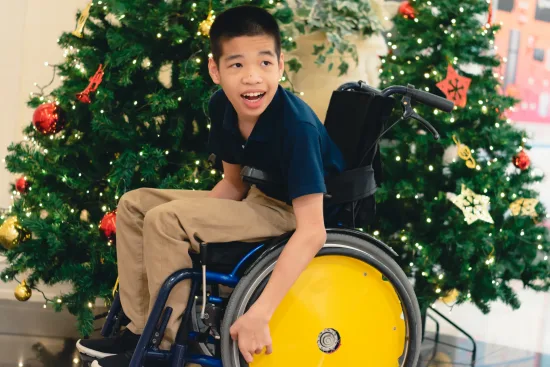
Fun, inclusive events the whole family can enjoy throughout Illinois!
How will you make memories this holiday season?
There are light displays, sensitive Santa opportunities, parades and more going on throughout Illinois.
Our Special Events page includes a roundup of opportunities designed specifically for youth with disabilities and special healthcare needs.
You can also browse this collection of special programs and event guides for opportunities to create some holiday magic and plenty of smiles:
- Autism Speaks and Cherry Hill Programs will provide sensory-friendly Santa experiences in Illinois and the St. Louis area on Dec. 3. These visits are free. Keepsake photo packages will be available for purchase. You must sign up to attend. Visit the Santa Cares website for a complete list of Santa’s stops. Be sure to select “Santa Cares”, “Caring Santa” or “Sensitive Santa” when checking your location. (Note some event dates and times may vary. Please check your location to confirm your date and time.)
- The National Federation of the Blind is offering letters from Santa and winter celebration letters in Braille to children who are blind or have low vision. The program is for children ages 10 and younger. Please complete the letter request form before Dec. 15. If you have any questions, call (410) 659-9314, ext. 2236, or email education@nfb.org.
- The Secret Sleigh Project is coordinating volunteers to provide in-home Santa visits to children who are medically fragile. Use the “Request a Santa Visit” form on the project’s website to request a visit.
- For families in the southern Illinois area, SI Families’ event calendar provides a great list of fun, seasonal activities. Other events in the area include Sensitive Santa at Heartland Regional Medical Center in Marion, the Carbondale Lights Fantastic Parade, and the DuQuoin Holiday Lights Fair.
- For options in central Illinois, check out these lists from ChambanaMoms.com and Springfieldmoms.org. Great places to see lights include Chatham Lights up the Park, Festival of Lights in East Peoria, and Mattoon Lightworks.
- For Chicagoland residents, WTTW Public Television, Chicago Parent Magazine and Kidlist have some great suggestions for things to do and see. Want to catch a show? Chicago Children’s Theatre features accessible weekends for children and their families.
- Don’t forget to check with your local zoos! The St. Louis Zoo and Lincoln Park Zoo will offer a sensory-friendly viewing option. Contact your local zoo to see what’s happening and when.
We will continue to add holiday events and activities, so please check our Special Events page often throughout the season.
If you know of a good sensory-friendly event to share, please email us at dscc@uic.edu.
Please note, the University of Illinois Chicago’s Division of Specialized Care for Children (DSCC) is not involved in organizing or scheduling these holiday events. If you have questions about a specific event, please contact the event sponsor or organizer.
DSCC Dad Helps Superheroes of All Abilities Unite in Southern Illinois
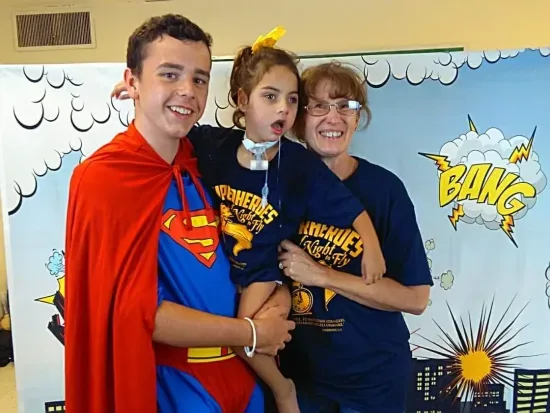
Pastor Tim Reynolds organizes the annual Special Needs Superheroes event to take place in Mount Vernon on Oct. 28
In Mount Vernon, superheroes of all kinds unite each year to bring joy to children and adults with disabilities.
Mount Vernon Baptist Temple’s annual Special Needs Superheroes event encourages individuals of all ages and abilities to dress as their favorite superhero and enjoy fall activities together. This popular free celebration returns for its fifth year on Oct. 28.
Pastor Tim Reynolds helped create the event and credits his wife, Melissa, and a dedicated group of volunteers with keeping it running. Reynolds’ daughter Isabella has complex medical needs and is a participant with the University of Illinois Chicago’s Division of Specialized Care for Children (DSCC).
Reynolds said the idea for the event came from a desire to serve his small community in southern Illinois.
“It can be hard for families and individuals with disabilities to go to a theme park. We have a church with a good layout, nice grounds, and a gymnasium,” Reynolds said. “I pastor two churches, and we decided to work together to create a special day for young and old alike that was as close to a carnival atmosphere as possible.”
Choosing a superheroes theme, the first event kicked off in 2018.
“I’m not sure why we chose the superheroes theme, but it fit, and it’s lots of fun. The first year we had about 400 attendees,” Reynolds said.
The event continued to grow each year except for a one-year gap in 2020 due to the COVID-19 pandemic.
“This year we’re planning for more than 800 guests. We have a bunch of folks who love Comic-Con. They have amazing costumes and travel from Missouri, Kentucky, Indiana and other places to help us year after year,” Reynolds said.
Volunteers from churches, 4-H clubs, government, and more serve as “buddies.” They help participants of all ages and abilities experience activities that include:
- A petting zoo and horseback rides
- Face painting and games
- Balloon tying with Rainbow the Clown
- Superhero photos
- Haircuts
- Brats, hamburgers, snow cones and popcorn
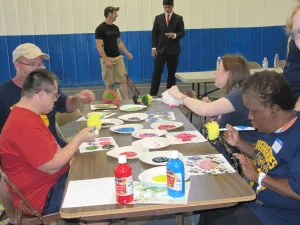
“It’s just a big kick. Some people like dressing up, others just like taking it all in,” Reynolds said. “I really love the horseback riding and seeing them with the animals. For some, it’s the first time they’ve ever ridden a horse or been able to touch and be up close to these animals. They’re so uninhibited in expressing their excitement and joy. You can’t help smiling all over.”
The guest list also includes community members and residents from area Community Integrated Living Arrangement (CILA) Homes.
The whole Reynolds family, including Isabella and her three older siblings, also take part in the fun.
Reynolds said his wife, Melissa, organizes all the details for the superheroes event. She prefers to remain in the background while he is “just the promoter and front man.”
“She is the rock of our family and works tirelessly caring for Isabella,” Reynolds said.
Isabella has Moebius syndrome, a rare neurological disorder that can cause paralysis, an inability to smile and other disabilities.
“We adopted her as a baby and the doctor said she wouldn’t live past a year old,” Reynolds said. “She’s a happy girl and recently turned 12.”
Isabella enrolled with DSCC shortly after birth and receives services through the Home Care Program. The Home Care Program helps children and young adults who need in-home nursing to safely live at home.
“We connected with DSCC at the hospital and really appreciate all that they do,” Reynolds said. “DSCC has helped us track down nursing services and medical equipment. They’re always there to help and are another go-to when you need help filling in the gaps.”
Members of our DSCC team from the St. Clair Regional Office will be at this year’s Special Needs Superheroes event to speak with families about our services.
The event takes place from 4 to 6:30 p.m. on Oct. 28 at Mount Vernon Baptist Temple, 817 Woodland Drive, in Mount Vernon. There is no charge to attend.
“Everything is completely free,” Reynolds emphasized. “There’s nothing better than the smiles and hugs you get from kids with sno-cone-covered faces. We started all of this to be a blessing to someone, but I think we, the volunteers, are truly the ones who go away blessed.”
See the Special Needs Superheroes flyer for more details or visit the Events section of our website.
If you’d like to attend, please call or text (618) 315-1111 to register. The deadline to sign up is Oct. 23.
Project Fire Buddies Helps DSCC Participant Attend Concert of Her Dreams
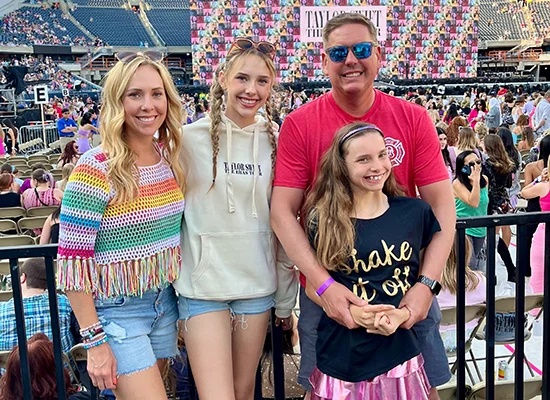
Lily Brown and her entire family saw Taylor Swift perform at Chicago’s Soldier Field
Lily Brown and her family experienced a whirlwind week earlier this month that they won’t soon forget.
The 14-year-old Oak Forest girl graduated from eighth grade. She then played in an adaptive Little League Challenger baseball game.
But the week’s biggest highlight was seeing Lily’s favorite artist Taylor Swift in concert at Soldier Field in Chicago on June 2.
“It was a very special week for all of us,” Lily’s mom, Jennifer Brown, said.
A nonprofit group of Chicago-area firefighters called Project Fire Buddies made the unforgettable concert experience possible.
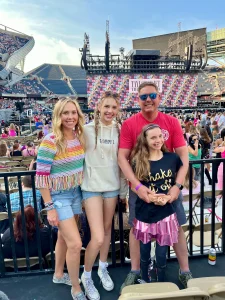
Lily has Rett syndrome, a rare genetic neurological disorder. The condition can severely affect abilities such as speaking, walking, eating and even breathing.
Lily has seizures and uses a wheelchair. Even though she doesn’t speak, she says a lot through her expressive eyes and huge smile.
She is also a participant with the University of Illinois Chicago’s Division of Specialized Care for Children (DSCC). DSCC partners with families to help them find the right services and resources for their child’s special healthcare needs.
In January, Lily turned 14. For her birthday present, Jennifer wanted to take her to see Taylor Swift, who announced her concert tour would include Chicago.
“I took her older sister, Grace, when she was about 9 years old to see Taylor Swift. It was a really special mother and daughter experience,” Jennifer explained. “I wanted Lily and I to have that same experience. Due to the pandemic, Taylor Swift hasn’t toured for a while.”
From the day the tour was announced, they searched for two accessible tickets nearly every day. But their search came up empty. Then, the Oak Forest Project Fire Buddies heard about Lily’s wish to see Taylor Swift.
The Oak Forest Fire Department created Project Fire Buddies in 2016. Its mission is to bring joy to kids struggling with serious illnesses and their families. Volunteers visit the kids throughout the year to deliver gifts for special occasions, play games, read books or just to say “hi” and spend time together.
“We love the fire buddies!” Jennifer said. “We’re so grateful for all that they do. They gave Lily a bike made specifically for her needs so that she can enjoy riding. This year, she’s also playing with the Challenger’s baseball team and enjoyed playing against the Project Fire Buddies team.”
Now, Project Fire Buddies has made Lily’s ultimate birthday wish come true and more.
“Our family usually has to use the divide and conquer approach. We don’t get to attend events together very often,” Jennifer said. “It was an incredible surprise to learn that our Oak Forest Fire Buddies chapter found tickets for our entire family and worked with Soldier Field to have the area accessible for Lily’s wheelchair. We were just blown away.”
Since no “Swifty” can go to a concert without bling, everyone made sure Lily had just what she needed for the big night.
“We made a cute ‘Shake it Off’ shirt with all the sparkle and bling any Swifty would be proud of,” Jennifer said. “We also made a sign, and friends also got her some flashy, light-up flare.”
The Brown’s had an amazing time – together – at the Taylor Swift concert.
“The show was incredible, and Lily loved it,” Jennifer said. “She did have a couple of seizures during the show but bounced back in time to catch her favorite song, ‘Shake it Off.’”
“Project Fire Buddies is hoping to expand to help more kids who are medically challenged or have life-threatening conditions,” Jennifer added. “The Oak Forest chapter is amazing and incredibly generous. They are an important part of Lily’s life, and we are so thankful.”
Visit our Resource Directory to learn more about Project Fire Buddies.
You can also read about the news coverage of Lily’s special concert experience:
Thank you to Project Fire Buddies for making Lily’s wish come true!
Upcoming Education and Scholarship Opportunities for Young Adults with Disabilities
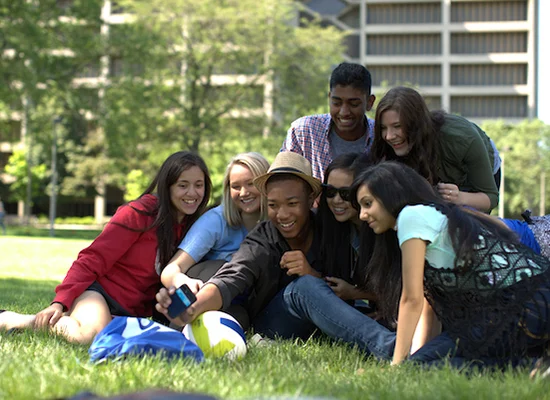
Learn more about the Illinois Community College Initiative and 2023 CSBG Scholarship Program
Finding the right programs and resources is key when planning for the future as a young adult with disabilities.
Two programs currently offer valuable education, training and scholarship opportunities for Illinois youth interested in college or joining the workforce after high school.
Illinois Community College Initiative
The Illinois Department of Human Services’ Division of Rehabilitation Services (DRS) wants to help people with disabilities in their quest for success.
The Illinois Community College Initiative provides academic and vocational training programs for eligible students with disabilities at in-state public community colleges and approved community colleges bordering the state.
People with disabilities who are eligible for the DRS vocational rehabilitation program are eligible to participate. You may complete community college coursework leading to an associate degree or to a degree, certificate or other industry-recognized credential or certificate.
DRS will help you with:
- Tuition
- The cost of fees, books and supplies
- Transportation costs
- Other eligible costs
See the Illinois Community College Initiative flyer for more details.
Spanish-speaking families can listen to the radio ad or read the ad transcript in Spanish.
Ready to get started? Contact your local DRS office using the locator tool or call (877) 581-3690. TTY and relay callers can dial 711.
2023 C.E.F.S. Economic Opportunity Corporation’s CSBG Scholarship
C.E.F.S. Economic Opportunity Corporation has a scholarship program to help students pay for college or occupational training.
The CSBG College Scholarship program provides financial help to income-eligible students living in the following counties:
- Christian
- Clay
- Effingham
- Fayette
- Montgomery
- Moultrie
- Shelby
You can use the scholarship to pay for formal education or occupational training in an accredited Illinois educational institution. Training and degrees may include:
- Associate, bachelor’s or master’s degree, post-secondary education
- General education, short-term training (two years or less) in growth occupation skills
The CSBG scholarship is competitive and awards students based on:
- Income
- The interview process
- Choosing to go into high technology areas or other growth occupations
Previous scholarship recipients can submit an application. You must be enrolled or intend to enroll as full-time students for the fall 2023 semester in an Illinois-accredited college. Full-time is 12 hours or more.
Click on the CSBG Scholarship application or get an application at your county C.E.F.S. outreach office. The application includes contact information for each local office.
You can also visit the C.E.F.S. website for more information.
You must complete your application and submit all requested documents to your local office by April 14 at 4 p.m.
All eligible candidates will have an interview in May.
Find More Transition Resources
Visit the Transition Tools section of our website to find more programs and information to help with planning and paying for college, getting a job and more.
You can browse the Transition: Education Resources and the Transition: Work Resources categories to find what you need.
Our team is also here to help partner with you and your family to help make the transition to adulthood as successful as possible.
Contact us to find out more!
Meet Medical Advisory Board Member Dr. Shubhra (Sue) Mukherjee
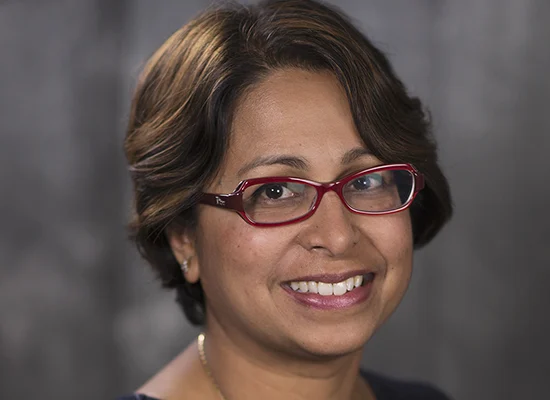
“DSCC understands the importance of supporting families and coordinating care.”
Dr. Shubhra Mukherjee, also known as Dr. Sue, is the medical director of pediatric and adolescent rehabilitation medicine at Shriners Children’s Chicago.
Mukherjee currently cares for patients up to age 22. Her background includes working with young adults with complex healthcare needs and collaborating across medical specialties to help these patients and their families connect with the care they need.
She has served on the Division of Specialized Care for Children’s (DSCC) Medical Advisory Board (MAB) for more than 16 years.
Mukherjee’s expertise in physical medicine and rehabilitation combined with a deep interest in the transition of care for children with complex healthcare needs has been a great fit.
“DSCC understands the importance of supporting families and coordinating care,” said Mukherjee. “I appreciate their statewide focus and how the MAB serves as an avenue for clinician input on what changes are needed, sharing feedback about the struggles we encounter helping patients get what they need, and working together to find solutions.”
Putting the Focus on Transition
When Mukherjee joined the board, schools were just beginning to explore the need to help students build the skills needed to transition to adulthood.
“They were looking at ways they could better prepare students to go on to jobs, college and life after high school,” Mukherjee explained. “In pediatric care, we realized that we needed to be doing the same thing for children with complex healthcare needs and their families.”
The DSCC team had the idea to increase the participation of medical professionals at the annual Illinois Statewide Transition Conference. We wanted to create a more proactive approach to helping children and their families make the transition from pediatric care to adulthood.
Mukherjee teamed up with DSCC’s former Title V Transition Specialist Darcy Contri to help put the idea into action.
“DSCC was already doing great work providing family support, tip sheets, and facilitating face-to-face conversations about transition. This was just one more piece of the puzzle,” said Mukherjee. “Darcy and I set up the first health care track for the Statewide Transition Conference with a goal of building more clinical engagement and increasing awareness and support for patients with complex health care needs and their families.”
The health care track has provided information and presentations with and for doctors and others providing complex care. According to Mukherjee, it continues to be a catalyst for building connections, sparking ideas, and inspiring healthcare professionals.
“I got to see that impact firsthand when one of our occupational therapists (OT) attended the conference with me,” Mukherjee said. “She was so moved that she became a big proponent of the OT’s role in developing and teaching adolescents skills related to health care.”
Opportunities to Collaborate
Mukherjee appreciates how the MAB fosters collaboration, networking and the development of partnerships. This work continues to create more options throughout Illinois for patients with complex care needs.
“It’s very rewarding to grow my knowledge and connect with like-minded professionals across so many different specialties,” Mukherjee said. “We’re able to share, provide feedback, and exchange ideas around removing barriers and supporting patients with complex healthcare needs at all stages.”
Mukherjee said DSCC also continues to be a major source of support for her own patients.
“Care coordination is so important for these families,” said Mukherjee. “DSCC helps them find the right care or specialist, get to appointments, and locate funding for the services they need to stay well and engage in their community. DSCC is there for the child and family.”
Mukherjee also leans on DSCC for updates and information.
“DSCC helps me keep track of program changes and learn about new services or programs that are available,” Mukherjee emphasized. “DSCC plays a vital role in sharing information and connecting the many different entities that individuals with complex needs depend on for their care.”
Awareness Brings Progress
Mukherjee said there is still a great need for education about the transition to adulthood and its importance.
“I’m glad to see the growing awareness and interest by professionals in helping youth develop the skills they need to be successful as adult users of the healthcare system,” said Mukherjee. “We are seeing more adult providers who understand the needs of young people with disabilities who are aging out of pediatric care.”
Awareness has brought progress, but challenges remain.
“Pediatric and adult care are not set up in the same way. For example, a spina bifida clinic and spinal care clinic are similar, but they are not the same. Adults with complex conditions going to a spinal care clinic may not be getting all of their needs met,” said Mukherjee. “The special pediatric clinic that addressed all their needs as a kid doesn’t exist in the adult care system.”
Mukherjee’s own focus on the transition to adulthood remains as strong as ever.
“I’ve been following some of the research initiatives at the University of Illinois Chicago. It’s exciting to see they are collecting data, exploring different aspects of complex care and its costs, and working towards building a framework that brings all the pieces together for adults with complex care needs,” she said.
“DSCC plays a vital role,” Mukherjee noted. “Sharing their information and ensuring it’s always there for the families we serve is important.”
Thank you, Dr. Sue, for your leadership to help families and professionals support the successful transition to adulthood!
Visit our Medical Advisory Board page to learn more about the MAB and its mission.
Sensory-Friendly Easter Bunny Visits
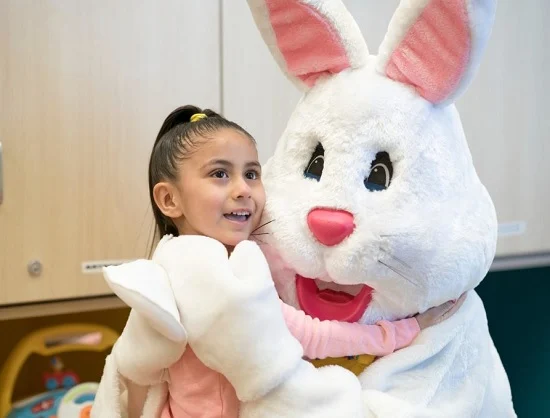
Hippity-hoppity, the Easter Bunny is on its way!
Sensory-friendly Easter Bunny visits are happening at sites throughout Illinois and the St. Louis area. Individuals of all ages and abilities may schedule an appointment.
The visits will take place in a calmer, quieter environment that supports visitors’ sensory, physical and developmental needs. Autism Speaks is partnering with Cherry Hill Programs to provide these special Easter Bunny photo events.
The Bunny Cares experiences are free. Photos will be available to buy at each event.
You can see the Easter Bunny on March 26 at the following locations (in the “Reserve” section for each location, click on the “Events” button and select “Bunny Cares”):
- Fox Valley
- Frontenac Plaza (Missouri)
- Hawthorn Mall
- Market Place Shopping Center
- Northwoods Mall
- Orland Square Mall
- White Oaks Mall
- Woodfield Mall (also hosting an event on April 2)
Reservations are limited. Visit the Bunny Cares website for a complete list of sites and to reserve your spot.
Many communities are also hosting sensory-friendly egg hunts and opportunities to meet the Easter Bunny. To find these events and other family-friendly spring activities, hop on over to our Special Events page.
New Health Insurance Education Series Open to All DSCC Families
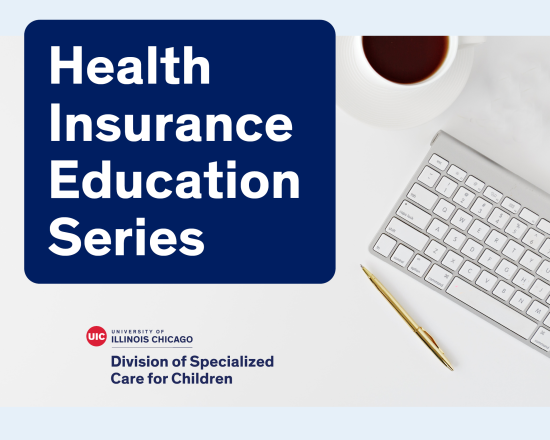
Free virtual training sessions in English and Spanish for Division of Specialized Care for Children participants, their families and all who are interested
Navigating the health insurance maze can be frustrating.
We’ve heard our participant families’ feedback and want to help improve the process.
Please join the University of Illinois Chicago’s Division of Specialized Care for Children (DSCC) for our new education series on important health insurance topics.
These free, family-focused sessions will help you better understand your coverage and benefits.
Sessions are virtual and open to DSCC participants, their families/caregivers and anyone interested in these topics.
The DSCC Health Insurance Education Series is the result of DSCC families’ questions and suggestions from our Family Advisory Council.
Our Benefits Management and Research (BMR) team will explain a different topic and answer your questions each month. They will present each session in English and in Spanish via Zoom.
Save the date for each session:
- Understanding Your Insurance
English: March 7, 6 p.m.
Spanish: March 8, 6 p.m.This training will help you understand your health insurance. It will go over the types of insurance plans and some important words to know. You will also learn what to do if you have many insurance plans and how to find a doctor.
Sign up for Understanding Your Insurance in English
Sign up for Understanding Your Insurance in Spanish
- Medicaid Eligibility and Coverage
English: April 11, 6 p.m.
Spanish: April 12, 6 p.m.This training will help you learn about Illinois Medicaid programs. It will discuss who can have Medicaid and the programs for children and adults. You will learn what Medicaid covers and how to keep Medicaid coverage through the yearly redetermination process.
Sign up for Medicaid Eligibility and Coverage in English
Sign up for Medicaid Eligibility and Coverage in Spanish
- Insurance Appeals
English: May 9, 6 p.m.
Spanish: May 11, 6 p.m.This training will cover information on health insurance appeals. You will learn what to do if your insurance doesn’t approve a service. You will also learn more about the appeal process and how to write an appeal letter. Examples will be available.
Sign up for Insurance Appeals in English
Sign up for Insurance Appeals in Spanish
Details about each series session are also posted on our Events page.
Each session will be recorded. You can access the recordings and related materials on our Family Education Webinars page.
There is no cost for families to participate.
If you have questions before or after a session, please email dscc@uic.edu or fill out our Contact Us form.
We hope you’ll join us!



